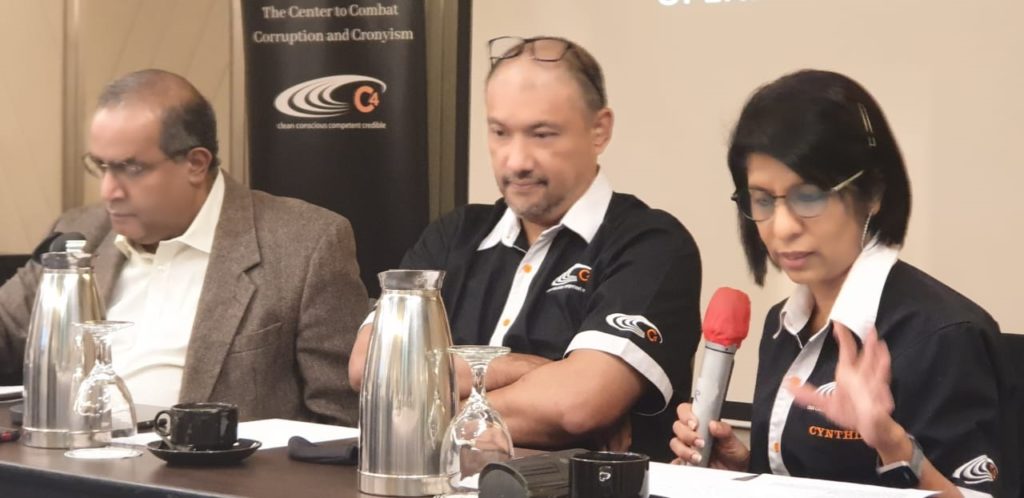
PETALING JAYA, Aug 6 – Pembinaan PFI Sdn Bhd, a dormant government-linked company (GLC) under the Ministry of Finance Inc (MoF Inc), and the Federal Lands Commissioner (FLC), which also has shares in Pembinaan PFI, have been tools for the government to channel contracts to GLCs, well-connected individuals and companies via the Private Finance Initiative (PFI) policy, a research report made public on Friday said.
More than 800 projects through 16 ministries were carried out under the name of PFI, a policy implemented by Pembinaan PFI, which was established in 2006 to enable the implementation of public projects through fundings from the private sector, except that the projects were not PFIs and their fundings amounting to RM30 billion in loans came not from the private sector but from two public institutions – the Employees Provident Fund and Kumpulan Wang Persaraan (WAP), according to the report.
The awarding of the “PFI” projects were also via direct negotiations and without any public disclosure, without any accounting in the national Budget and a complete lack of transparency – in essence an abuse of the PFI policy, said authors Pushpan Murugiah, Dr Edmund Terence Gomez of the “PFI: The Search for Accountability” made public on Friday by The Center to Combat Corruption and Cronyism (C4).
Explaining to the media the complicated workings between Pembinaan PFI, FLC, EPF and KWAP (the latter two are entities under the MoF), involving loans from the two pension bodies with land parcels from FLC as collaterals to implement the projects, the authors said Pembinaan PFI, a shell company which only has directors, and without any operational staff or cost has been also left with a debt of RM29 billion.
“This extremely complex structure encompasses control of the bureaucratic and financial arms of the state as well as monitoring agencies…with the introduction of PFI, government leaders (politicians and bureaucrats) moved to link an ensemble of key public institutions to implement projects under the policy’s name. EPF and KWAP were used to obtain loans amounting to RM30 billion – with government land parcels used as collateral- to fund public projects awarded in a non-transparent manner to well-connected people and GLCs.
“The leasing of a huge number of land parcels to Pembinaan FYI by an obsure but important GLC, Federal Lands Commissioner, for a mere sum of RM10, though subsequently increased to RM5.7 billion, who then sub-leased them back to the government for RM29 billion was a flagrant abuse of power. The government was paying Pembinaan FYi high rental fees for parcels of land it previously used at zero cost.”
Without the accounting in the Budget tabled in Parliament, there is also the implication of higher level of national debts.
The authors and C4 Executive Director Cynthia Gabriel raised several questions during the briefing, including why a probe into Pembinaan PFI by the Malaysian Anti-Corruption Commission (MACC) in 2018 stopped midway.
Several recommendations have been made in the report including calling for a Royal Commission of Inquiry (RCI) into Pembinaan PFI, with the emphasis that this should be done before the 15th General Election.
Other questions raised at the briefing were: What is the need for the continued existence of Pembinaan PFI when there is already Unit Kerjasama Awam Swasta (UKAS), under the Prime Minister’s Office which has been tasked to solely carry out all public-private partnership (PPP) projects including PFIs?
Why are there borrowings from statutory bodies like EPF and KWAP to finance the projects when they are supposed to be financed by the private entities till completion of the projects and delivery to the government?
Why very little is known of FLC, which has ownership of a vast volume of land in the peninsula, as well as in Sabah and Sarawak? According to the report, a day before securing the first loan of RM20 billion from EPF, Pembinaan PFI signed an agreement in August 2007 with the government to lease 186 parcels of land – administered by FLC – scattered across the country. In March 2022, the government disclosed that former Prime Minister Abdullah Ahmad Badawi was awarded a plot of land valued at RM76 million in 2009. Former Prime Minister Datuk Seri Najib Tun Razak had also applied for a land valued at RM100 million but later withdrew his application when a controversy erupted on this.
“Since there is little public knowledge of MoF Inc and the FLC, nor the volume of assets they each own, politicians have been able to abuse them at will.
“The people responsible for ensuring that this well-assembled patronage machinery functions properly are ultimately bureaucrats, under the dictate of politicians in the Cabinet, though primarily through the MoF.”
Among the calls being made by C4 is the identification of all parcels of lands owned by FLC that were used a collateral for loans and determine how to stop rental payments for them, a listing of all beneficiaries of contracts awarded by Pembinaan PFI.
Recommendations included an immediate review of PFI, public contracts be awarded through open tenders, and the introduction of a legislation on public procurement.
Cynthia said the report took two years of research and has input from the Auditor-General’s Report, as well as information from the EPF and following meetings with them.
However, C4 failed to get a meeting with the Ministry of Finance, Government Investment Companies Division (GIC) although they had written in to request for a meeting to discuss the report.
The full report is available at the C4 website:https://c4center.org/
–WE